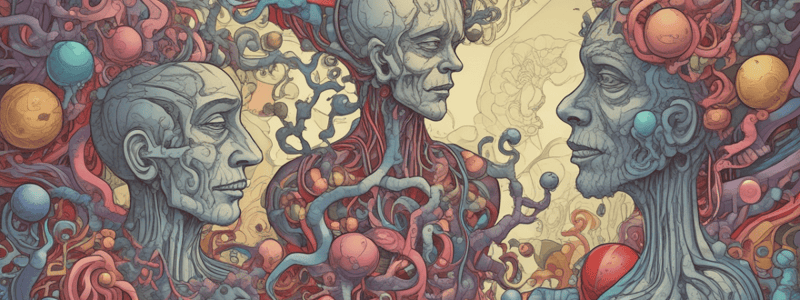Podcast
Questions and Answers
What is the primary therapeutic use of scopolamine?
What is the primary therapeutic use of scopolamine?
- Treatment of bronchospasm associated with chronic obstructive pulmonary disease (COPD)
- Management of asthma
- Prevention of motion sickness and postoperative nausea and vomiting (correct)
- Mydriasis and cycloplegia
What is a unique effect of scopolamine compared to atropine?
What is a unique effect of scopolamine compared to atropine?
- It produces sedation
- It produces mydriasis
- It blocks short-term memory (correct)
- It causes bronchospasm
What is the duration of action of ipratropium as a bronchodilator?
What is the duration of action of ipratropium as a bronchodilator?
- Variable depending on the individual
- Unknown
- Short-acting (correct)
- Long-acting
What is the primary reason why ipratropium and other quaternary derivatives do not enter the systemic circulation or CNS?
What is the primary reason why ipratropium and other quaternary derivatives do not enter the systemic circulation or CNS?
What is the duration of mydriasis produced by tropicamide?
What is the duration of mydriasis produced by tropicamide?
What is the main advantage of scopolamine over other anti-motion sickness drugs?
What is the main advantage of scopolamine over other anti-motion sickness drugs?
What is a potential adverse effect of scopolamine?
What is a potential adverse effect of scopolamine?
What is the route of administration for ipratropium and other quaternary derivatives?
What is the route of administration for ipratropium and other quaternary derivatives?
What is the classification of glycopyrrolate, tiotropium, and aclidinium?
What is the classification of glycopyrrolate, tiotropium, and aclidinium?
Which type of receptors do antimuscarinic agents block?
Which type of receptors do antimuscarinic agents block?
What is the primary action of atropine on the eye?
What is the primary action of atropine on the eye?
What is the duration of atropine's general actions?
What is the duration of atropine's general actions?
What type of antidepressants have antimuscarinic activity?
What type of antidepressants have antimuscarinic activity?
What is the mechanism of atropine's action on muscarinic receptors?
What is the mechanism of atropine's action on muscarinic receptors?
What is the primary site of action of ganglionic blockers?
What is the primary site of action of ganglionic blockers?
What is the effect of atropine on sweat and saliva secretion?
What is the effect of atropine on sweat and saliva secretion?
What type of agents are used as skeletal muscle relaxant adjuvants in anesthesia?
What type of agents are used as skeletal muscle relaxant adjuvants in anesthesia?
What is the effect of atropine on bronchial tissue?
What is the effect of atropine on bronchial tissue?
What is the main advantage of trospium in treating overactive bladder in patients with dementia?
What is the main advantage of trospium in treating overactive bladder in patients with dementia?
What is the main characteristic of ganglionic blockers?
What is the main characteristic of ganglionic blockers?
What is the effect of nicotine on autonomic ganglia?
What is the effect of nicotine on autonomic ganglia?
What is the mechanism of action of nondepolarizing neuromuscular-blocking agents?
What is the mechanism of action of nondepolarizing neuromuscular-blocking agents?
What is the primary use of ganglionic blockers?
What is the primary use of ganglionic blockers?
What is the effect of extended-release formulations and transdermal patches on adverse effects?
What is the effect of extended-release formulations and transdermal patches on adverse effects?
What is the characteristic of curare?
What is the characteristic of curare?
What is the effect of nicotine on neurotransmitters?
What is the effect of nicotine on neurotransmitters?
What is the primary difference between depolarizing and nondepolarizing neuromuscular-blocking agents?
What is the primary difference between depolarizing and nondepolarizing neuromuscular-blocking agents?
What is the primary mechanism by which succinylcholine is terminated?
What is the primary mechanism by which succinylcholine is terminated?
What is the primary indication for the use of succinylcholine in anesthesia?
What is the primary indication for the use of succinylcholine in anesthesia?
What is the potential consequence of administering succinylcholine to a patient with a deficiency in plasma cholinesterase?
What is the potential consequence of administering succinylcholine to a patient with a deficiency in plasma cholinesterase?
What is the benefit of administering a small dose of nondepolarizing neuromuscular blocker prior to succinylcholine?
What is the benefit of administering a small dose of nondepolarizing neuromuscular blocker prior to succinylcholine?
What is the primary mechanism by which succinylcholine causes hyperkalemia?
What is the primary mechanism by which succinylcholine causes hyperkalemia?
What is the recommended method of administration for succinylcholine when a longer duration of action is desired?
What is the recommended method of administration for succinylcholine when a longer duration of action is desired?
What is the potential consequence of administering succinylcholine to a patient with electrolyte imbalances?
What is the potential consequence of administering succinylcholine to a patient with electrolyte imbalances?
What is the pharmacological effect of succinylcholine that makes it useful in electroconvulsive shock treatment?
What is the pharmacological effect of succinylcholine that makes it useful in electroconvulsive shock treatment?
What is the primary reason for the rapid onset of action of succinylcholine?
What is the primary reason for the rapid onset of action of succinylcholine?
What is the effect of atropine on gastric motility?
What is the effect of atropine on gastric motility?
Which of the following is NOT an effect of atropine on the cardiovascular system?
Which of the following is NOT an effect of atropine on the cardiovascular system?
What is the main reason why atropine is not used to treat peptic ulcers?
What is the main reason why atropine is not used to treat peptic ulcers?
Which of the following is a side effect of atropine?
Which of the following is a side effect of atropine?
What is the therapeutic use of topical atropine?
What is the therapeutic use of topical atropine?
Which of the following does NOT cause an increase in heart rate?
Which of the following does NOT cause an increase in heart rate?
What is the effect of atropine on the sinoatrial node?
What is the effect of atropine on the sinoatrial node?
Why is pirenzepine preferred over atropine for treating peptic ulcers?
Why is pirenzepine preferred over atropine for treating peptic ulcers?
What is the reason why atropine is not preferred for pupillary dilation?
What is the reason why atropine is not preferred for pupillary dilation?
Flashcards are hidden until you start studying
Study Notes
Cholinergic Antagonists
- Cholinergic antagonists are agents that bind to cholinoceptors and prevent the effects of acetylcholine (ACh) and other cholinergic agonists.
Antimuscarinic Agents
- Antimuscarinic agents, also known as anticholinergic drugs, block muscarinic receptors, causing inhibition of muscarinic functions.
- These agents block some sympathetic neurons that are cholinergic, such as the salivary and sweat glands.
- They do not block nicotinic receptors, and therefore have little or no action at skeletal neuromuscular junctions (NMJs) or autonomic ganglia.
Atropine
- Atropine is a tertiary amine belladonna alkaloid with a high affinity for muscarinic receptors.
- It binds competitively and prevents ACh from binding to those sites.
- Atropine acts both centrally and peripherally, with effects lasting about 4 hours.
- Neuroeffector organs have varying sensitivity to atropine, with the greatest inhibitory effects on bronchial tissue and the secretion of sweat and saliva.
Actions of Atropine
- Eye: • Atropine blocks muscarinic activity in the eye, resulting in mydriasis (dilation of the pupil), unresponsiveness to light, and cycloplegia (inability to focus for near vision). • In patients with angle-closure glaucoma, intraocular pressure may rise dangerously.
- Gastrointestinal (GI): • Atropine can be used as an antispasmodic to reduce activity of the GI tract. • Although gastric motility is reduced, hydrochloric acid production is not significantly affected.
- Cardiovascular: • Atropine produces different effects on the cardiovascular system, depending on the dose. • At low doses, the predominant effect is a slight decrease in heart rate. • Higher doses of atropine cause an increase in heart rate by blocking the M2 receptors on the sinoatrial node.
- Secretions: • Atropine blocks muscarinic receptors in the salivary glands, producing dryness of the mouth (xerostomia). • The salivary, sweat, and lacrimal glands are sensitive to atropine.
Therapeutic Uses of Atropine
- Ophthalmic: • Topical atropine exerts both mydriatic and cycloplegic effects, allowing for the measurement of refractive errors without interference by the accommodative capacity of the eye.
- Antispasmodic: • Atropine is used to relax the GI tract.
Scopolamine
- Scopolamine is one of the most effective anti–motion sickness drugs available.
- It also has the unusual effect of blocking short-term memory.
- In contrast to atropine, scopolamine produces sedation, but at higher doses, it can produce excitement.
- Scopolamine may produce euphoria and is susceptible to abuse.
Therapeutic Uses of Scopolamine
- The therapeutic use of scopolamine is limited to prevention of motion sickness and postoperative nausea and vomiting.
- For motion sickness, it is available as a topical patch that provides effects for up to 3 days.
Ipratropium, Tiotropium, Aclidinium, and Glycopyrrolate
- These agents are quaternary derivatives or synthetic quaternary compounds.
- They are approved as bronchodilators for maintenance treatment of bronchospasm associated with chronic obstructive pulmonary disease (COPD).
- They are delivered via inhalation and do not enter the systemic circulation or the CNS, restricting effects to the pulmonary system.
Ganglionic Blockers
- Ganglionic blockers specifically act on the nicotinic receptors of both parasympathetic and sympathetic autonomic ganglia.
- These drugs show no selectivity to the parasympathetic or sympathetic ganglia and are not effective as neuromuscular antagonists.
- Except for nicotine, the other drugs mentioned in this category are nondepolarizing, competitive antagonists.
Neuromuscular-Blocking Agents
- These drugs block cholinergic transmission between motor nerve endings and the nicotinic receptors on skeletal muscle.
- They possess some chemical similarities to ACh and act as either antagonists (nondepolarizing) or agonists (depolarizing) at the receptors on the endplate of the NMJ.
Succinylcholine
- Succinylcholine is a nondepolarizing neuromuscular blocker used to relax skeletal muscles.
- It is useful when rapid endotracheal intubation is required during the induction of anesthesia.
- It is also used during electroconvulsive shock treatment.
- Its brief duration of action results from redistribution and rapid hydrolysis by plasma pseudocholinesterase.
- Adverse effects of succinylcholine include: • Hyperthermia • Apnea • Hyperkalemia
Studying That Suits You
Use AI to generate personalized quizzes and flashcards to suit your learning preferences.




